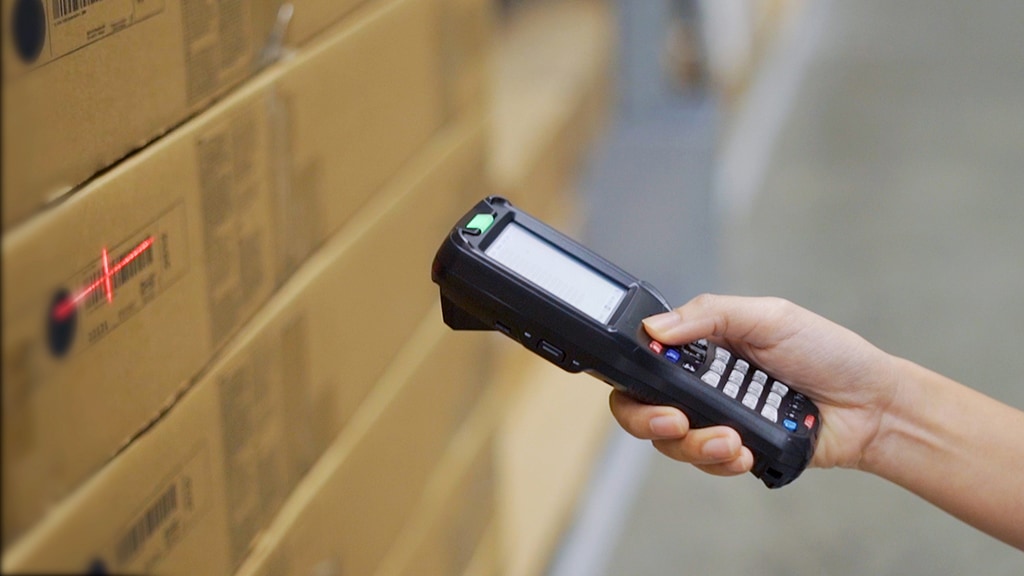Best Barcoding Systems For Small Business: 2023 Guide

If you sell products and one day hope to have an operational footprint bigger than your garage, implementing a barcoding system is a no-brainer.
A barcoding system for small businesses lowers labor costs and streamlines inventory management by reducing the amount of time warehouse workers spend receiving shipments, picking items for fulfillment, and counting items in stock.
Automating inventory management also improves efficiency in other areas. Potentially costly human errors are avoided when technology performs repetitive tasks, and the data gathered by barcode systems provide decision-makers with accurate and timely information.What’s more, warehouse scanning equipment can pay for itself in just a few months and provide benefits for decades, but the road to improved efficiency and lower overheads can be a rocky one.
Before you choose a barcoding system for your business, it’s best to think about features you might want in the future, as well as your current needs.
You should also compare the features and benefits offered by several providers before you make your final decision.
Let’s take a look at some of the top players in this market sector.
Fishbowl Inventory
Fishbowl Inventory has become the leading warehouse management solution because it is so easy to use. For example, companies that have reviewed this software say that their entire departments were fully trained in just a few hours.
Fishbowl Inventory has a one-time upfront cost of $4,395, but that price includes QuickBooks, Adobe, Amazon, Shopify, and Salesforce integration.
There is no free version of Fishbowl Inventory, but the company does offer a free trial.
Pros:
- QuickBooks integration
- Real-time data transfer
- No monthly subscription
- Live in-person training
- Free trial
Cons:
- Expensive
- No free version
- Does not work with Chrome
HandiFox Desktop
HandiFox Desktop is a popular cloud-based SaaS solution, but you will have to look elsewhere if your company uses Linux or Apple desktops, as this software only runs on Windows. If that is not a problem, HandiFox Desktop could be a great choice.
This software is tightly integrated with QuickBooks, and it lets users track and manage inventory using wireless devices like phones and tablets. HandiFox Desktop subscriptions are based on the number of mobile devices connected to the service, but they start at just $39 per month.
Pros:
- Inexpensive
- Cloud-based
- Real-time data
- Phone and live chat support
- Live and online training
Cons:
- Does not run on Linux or Mac desktops
- Editing information can be tricky
- No free version
Finale Inventory
Finale has carved out a place for itself in a crowded marketplace because it sends information about stock levels to online marketplaces like eBay and Amazon in real-time.
Finale is used by large retailers because it can handle 2 million products and half a million monthly orders, but smaller companies may be able to find similar features elsewhere for less money.
Finale subscriptions start at $75 per month or $750 per year, and the company offers both a free trial and a free version.
Pros:
- Works with 1D and 2D barcodes and labels
- Free version available
- Real-time stock tracking
- Around-the-clock phone support
- Live and online training
Cons:
- Not compatible with mobile devices
- No in-person training
- Lacks some important reporting features
Acctivate Inventory Software
Activate Inventory Software is marketed as a solution for growing small and medium-sized businesses, which makes its $7,995 price tag seem a bit pricier than others on this list.This software uses the latest technology to allow users to see and manage inventory levels in real-time, and it can handle purchasing and fulfillment for multiple sales channels.
Pros:
- Best-in-class technology
- Can manage multiple sales channels
- Phone and online support
- Free trial available
- Designed specifically to work with QuickBooks
Cons:
- Expensive
- Purchase orders cannot be edited
- Requires a lot of training
BarTender
Many manufacturers and healthcare companies use BarTender because it can create and manage RFID tags and plastic cards, as well as labels and barcodes.
BarTender integrates seamlessly with popular business systems like Oracle, NetSuite, and Epicor, and its template library makes designing barcodes and labels a snap.
The BarTender website does not list any prices, but customers who have reviewed the software say they made a one-time payment of $495.
Pros:
- Creates RFID tags and plastic cards
- Changes are sent to the entire system immediately
- Easy to use
- Integrates with most business systems
- In-person training
Cons:
- Does not work with iOS
- No support for mobile devices
- Lacks advanced inventory management features
Label Flow
Like BarTender, Label Flow is a software solution that is used to make and print labels, barcodes, and RFID tags. There are more than 2,500 pre-defined templates to choose from, or users can design their own labels.
Label Flow can be installed in minutes, and it is designed to share information with Access, Excel, and MySQL databases. The software costs $500, and a free trial is available.
Pros:
- Easy to use
- Affordable
- Creates and prints RFID tags
- Large selection of templates
- Prints 1D and 2D barcodes
Cons:
- Not an inventory management solution
- Few customer support options
- Only works on Windows
Wasp InventoryCloud
Wasp InventoryCloud has a client list that includes industry giants like Boeing, Sony, and IBM, so its $595 per year starting price point seems quite affordable.The cloud-based service has been designed to work with both Android and iOS mobile devices, and it can manage several warehouses and consolidate shipments from multiple suppliers and vendors.
Companies that want a self-hosted solution can spend up to $6,995 on Wasp InventoryCloud, but that price includes every feature available.
Pros:
- Easy to set up and use
- Affordable
- Impressive client list
- Excellent inventory management features
- Live training
Cons:
- Dated interface
- Some features cost extra
- Canceling the service can be difficult
Ordoro
Ordoro offers a free version that includes multi-carrier shipping, batch label printing, and order management features. These should be more than enough to handle the needs of companies with one sales channel and process fewer than 1,000 orders per month.Pricing for additional sales channels and larger order volumes is pretty reasonable, considering all packages include barcode generation, pick and pack verification, and inventory management with real-time updates.
Pros:
- Good value for money
- Free trial
- 15-day money-back guarantee
- Lots of useful features
- Scalable
Cons:
- No in-person training
- No support for mobile devices
- Some features are difficult to use
Flowtrac
You will have to do your homework if you are interested in Flowtrac because no free trial is available. On a positive note, prices start at a reasonable $100 per month per user.
Flowtrac is primarily a warehouse management tool, but it includes useful features like QuickBooks, UPS, and FedEx integration.
The software runs on just about any kind of desktop or mobile device, and support is available over the phone, online, or from a user help forum.
Pros:
- Reasonable price
- Excellent customer support
- In-person training
- Easy to use
- Customizable
Cons:
- No free trial
- Adding users increases the price
- Integrating with some business systems can be tricky
Zoho Inventory
Zoho Inventory is a cloud-based inventory management solution. The system is one of the most comprehensive barcoding tools on the market, and it makes it easy to create labels and barcodes of any kind. It works with both iOS and Android devices too.
Support is available over email and live chat, or users can access an extensive knowledge base. They have a free plan for solopreneurs, but their most popular plan is their Premium option, which is $159 a month per organization.
With that, you get 15,000 orders per month, 15,000 shipping labels per month, and 15,000 Aftership tracking per month – perfect for a small business that’s flexing its muscles!
Pros:
- Affordable
- Easy to set up and use
- Good range of features
- Excellent customer support
- Mobile-friendly design
Cons:
- Complicated interface
- Limited customization options
- Not a good fit for manufacturing, distribution, and retail POS
Which Barcoding System is Best?
Ultimately, the best barcoding system for small businesses will depend on their specific needs and budget.
If you can, give each of the aforementioned platforms a try via a free trial, or hop on a demo with a sales rep.
Don’t pay for features you won’t use, and make sure your barcoding platform can grow with your business goals.
To help get your barcoding system set up, learn how to make your own barcodes and how to pick the right barcode printer and scanner.
[html_blocks id=”20106″]

